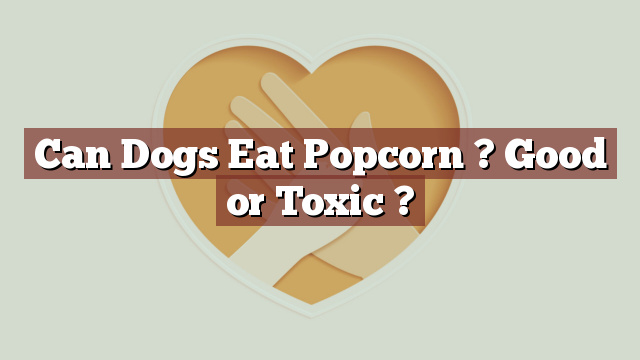Can Dogs Eat Popcorn? Good or Toxic?
As pet owners, it is important for us to be aware of what foods are safe for our furry friends to consume. This knowledge ensures that we are providing them with a healthy and balanced diet, while also preventing any potential harm. Today, we will be addressing a common question amongst dog owners: can dogs eat popcorn?
Nutritional Value of Popcorn for Dogs
Popcorn is a popular snack enjoyed by many humans, but what about our canine companions? Popcorn is primarily made from corn kernels, which are a good source of carbohydrates, fiber, and some essential minerals. It is low in calories and fat, making it a relatively healthy snack for humans in moderation. However, when it comes to dogs, the nutritional value of popcorn may not be as beneficial.
Can Dogs Eat Popcorn? Safety and Toxicity
Can dogs eat popcorn? The answer is yes, dogs can eat popcorn, but with some precautions. Plain, air-popped popcorn is safe for dogs to consume in small amounts. However, there are a few important factors to consider. The first is the way popcorn is prepared. Butter, salt, and other seasonings commonly added to popcorn can be harmful to dogs. These ingredients can lead to gastrointestinal upset, pancreatitis, or even sodium poisoning in excessive amounts. Therefore, it is crucial to only offer plain, unsalted popcorn to your furry friend.
Additionally, the size and texture of popcorn can pose a choking hazard for dogs, especially small breeds. The hard and round shape of popcorn kernels can easily become lodged in a dog’s throat or cause obstructions in the digestive tract. Therefore, it is essential to monitor your dog while they are eating popcorn and ensure they chew it thoroughly.
Potential Risks and Benefits of Dogs Eating Popcorn
While popcorn itself may not provide significant health benefits to dogs, it can still be used as an occasional treat or a tool for training purposes. The fiber content in popcorn can aid in digestion and promote bowel regularity in dogs. However, it is important to remember that the nutritional needs of dogs are different from humans. Therefore, popcorn should not replace their regular diet and should only be given in small quantities.
On the other hand, the potential risks of dogs eating popcorn should not be overlooked. As mentioned earlier, the added seasonings and butter commonly found on popcorn can be harmful to dogs. Furthermore, the aforementioned choking hazard is a significant concern, especially for dogs who tend to gulp their food quickly. If your dog has a history of digestive issues or is prone to choking, it is best to avoid giving them popcorn altogether.
What to Do If Your Dog Eats Popcorn
If your dog accidentally consumes popcorn that contains harmful ingredients or if they experience any adverse reactions after eating popcorn, it is essential to take action promptly. Contact your veterinarian for guidance and advice. They will be able to assess the situation and provide appropriate medical treatment if necessary.
Conclusion: Popcorn – A Treat or a Potential Danger for Dogs?
In conclusion, while popcorn can be enjoyed by dogs in moderation, it is crucial to be cautious. Dogs can eat popcorn, but only plain, unsalted popcorn should be offered. The added seasonings and butter found on popcorn can be harmful, and the choking hazard should not be ignored. If you decide to give your dog popcorn as an occasional treat, ensure they are closely supervised while eating and that the popcorn is thoroughly chewed. Remember that consulting your veterinarian is always the best course of action when it comes to your pet’s health and dietary needs.
Thank you for investing your time in exploring [page_title] on Can-Eat.org. Our goal is to provide readers like you with thorough and reliable information about various dietary topics. Each article, including [page_title], stems from diligent research and a passion for understanding the nuances of our food choices. We believe that knowledge is a vital step towards making informed and healthy decisions. However, while "[page_title]" sheds light on its specific topic, it's crucial to remember that everyone's body reacts differently to foods and dietary changes. What might be beneficial for one person could have different effects on another. Before you consider integrating suggestions or insights from "[page_title]" into your diet, it's always wise to consult with a nutritionist or healthcare professional. Their specialized knowledge ensures that you're making choices best suited to your individual health needs. As you navigate [page_title], be mindful of potential allergies, intolerances, or unique dietary requirements you may have. No singular article can capture the vast diversity of human health, and individualized guidance is invaluable. The content provided in [page_title] serves as a general guide. It is not, by any means, a substitute for personalized medical or nutritional advice. Your health should always be the top priority, and professional guidance is the best path forward. In your journey towards a balanced and nutritious lifestyle, we hope that [page_title] serves as a helpful stepping stone. Remember, informed decisions lead to healthier outcomes. Thank you for trusting Can-Eat.org. Continue exploring, learning, and prioritizing your health. Cheers to a well-informed and healthier future!

